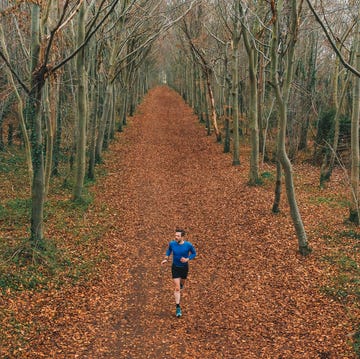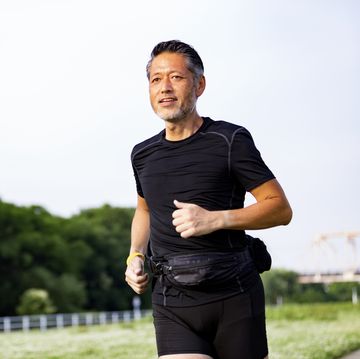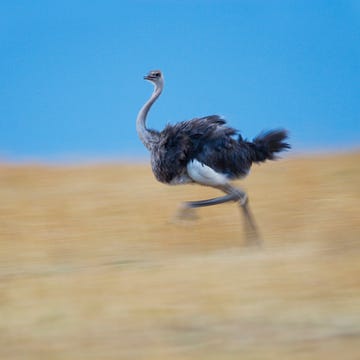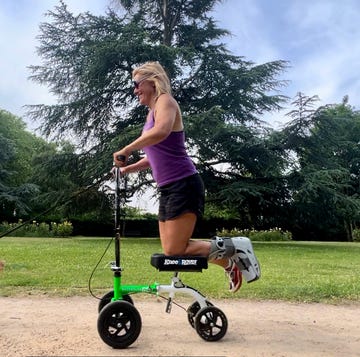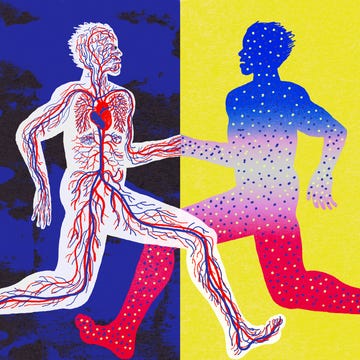In June last year, at the age of 47, UK 400m record holder Iwan Thomas ran what might have been his slowest ever lap of an athletics track. Thomas, who in 1997 covered the distance in 44.36 seconds, and who won a gold medal in the 4x400m at the Athens World Championships the same year, was in a vastly different place, physically and mentally, as he crawled around Eastbourne Sports Club’s circuit to complete the South Downs Way 100 ultra race.
He thinks this one took him around three minutes; then again, a 100-mile journey turns out to be, roughly, a fitting 400 400m segments, so perhaps it was destiny that he should end up being the first ever Olympic sprinter to take on such a distance.
‘It’s all a blur still,’ he says when we speak about three weeks after the event. ‘I can’t remember a lot of it. I really enjoyed it, but 100 per cent it was the toughest thing I’ve ever done.’
As a naturally garrulous post-athletics TV personality who has appeared on everything from Runners World, Part of the Hearst UK Wellbeing Network to Countdown’s Dictionary Corner, Thomas's foggy memory doesn’t stop him from having plenty to say about his debut ultra experience. Until this year, his longest run had been the London Marathon (eight times), but he thinks he still isn’t suited to hours on his feet.
‘In the marathons, people would pass me and say, “Come on, mate, you should be up the top! You’re an Olympic medallist!” But I’m 15-and-a-half stone. I was designed to go from A to B in 44 seconds. I wasn’t meant to conserve energy and not have high knee lift or long stride length.’
So he knew it would be brutal, but was inspired to take it on because he had already faced the biggest challenge of his personal life. At the end of 2018, his newborn son Teddy became desperately ill with a Group B Streptococcus infection (more commonly known as Strep B). Thomas entered the SDW100 to raise awareness of the need for women to take a test to see if they are carrying the bacteria during pregnancy. At the time of writing, he had raised almost £25,000 for the charity Group B Strep Support.
‘I’ve had so many messages from people whose children have died or become brain damaged because of this,’ he says. He did the run with a photo of Teddy to hand and the words “For those less fortunate” written on his arm. ‘Every time it hurt, I would look at that and look at my picture and it would remind me why I was there.’
Even before the race began, he was in trouble. Having trained hard towards the end of last year, in December he was involved in a motorway car crash that left him unable to run for the next three months. Then the race organisers requested that he complete a 50-mile run to prove that he’d be able to cope with the 100. He did that, running from Farnham to Portsmouth six weeks before the big race, but suffered such severe tendonitis that he limped the last 15 miles and was advised by doctors to rest until after the 100 had been and gone.
No chance: ‘My philosophy was that the 100-miler was going to hurt me anyway, so just suck it up and do it,’ he says. ‘And the body is a weird and wonderful thing. By about mile 10, my good foot was hurting so much that I wasn’t noticing the bad foot, so I thought I’d be all right.’
Other mishaps included accidentally following the route of a simultaneous half marathon and heading three miles off course; losing his running partner, Mike Seaman, owing to problems with the heat at around mile 40; and hitting the 60-mile checkpoint with just four minutes to spare before the cut-off. Then the worst happened: as darkness approached, he got a call to tell him that his son had been taken to hospital in an ambulance. ‘That was the worst moment. Do I stop in the middle of nowhere and try and get a taxi back to Southampton, or do I carry on? I knew he was in great hands, so I had to finish.’
He made it from Winchester to that final lap of the Eastbourne track in 29 hours and 35 minutes, the 304th out of 308 finishers, although 433 started the race. ‘All the emotions came out at the finish. As soon as I stopped my watch I collapsed. Couldn’t move. I had to get carried to the car. Once my body knew it didn’t have to move any more, it just shut down.’
As he digests his achievement, he’s already contemplating the next time, not least because that undimmed Olympian mentality means he’s convinced he could have done it faster. ‘My mind made my body go to a place it wasn’t ready for, and I’m paying for that now. I still can’t feel my right toes,’ he admits. ‘I promised my family I’d never do it again, but I’m already thinking there’s some unfinished business here...’




